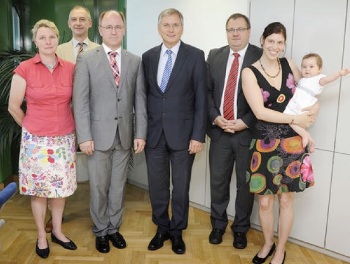Luboš Borkovec Rakouská Komora veterinárních lékařů 27. 5. 2015
Následovalo oficiální jarní přivítání v zámeckém hotelu Wilhelminenberg, kde hlavním mottem bylo ODPOVĚDNOST, KOMPETENCE A BEZPEČÍ: VÁŠ VETERINÁŘ . Po úvodní impulzní přednášce dvorního rady prof. Dr. Josefa Köfera – O jatečných zvířatech a prohlídce masa pod zodpovědností veterinárního lékaře – následovala pódiová diskuse, kde účastníky byli zástupci nejen z oblasti veterinární medicíny, ale z oblasti humánní medicíny, ze zemědělství, školství i z oblasti vnitra a bezpečnosti.
Složení Rakouské Komory veterinárních lékařů Představenstvo : Prezident Mag. Kurt Frühwirth 1. Viceprezident Mag. Alexander Tritthart 2. Viceprezident Mag. Dietmar Gerstner 3. Viceprezidentka Dr. Barbara Wieserová 4. Viceprezidentka Mag. Eva Müllerová Problém petpasů Petpasy v Rakousku vydává pouze jeden právní subjekt, a tím je Rakouská Komora. Za KVL ČR jsem informoval, že v ČR, kde je těchto – petpasů vydávajících – subjektů víc a k chovateli se tak petpasy mohou dostat i jinou cestou než přes veterinárního lékaře. Veterinární lékař je však za všech okolností vždy dohledatelný a kontrolovaný jak Komorou, tak i inspektory z SVS ČR. Provádět dozor nad špatným chovem přísluší SVS ČR a členové KVL ČR určitě nebudou váhat veterinárním inspektorům k podobným případům dodat informace. Z průběhu setkání byl zaznamenán tento protokol:
|




